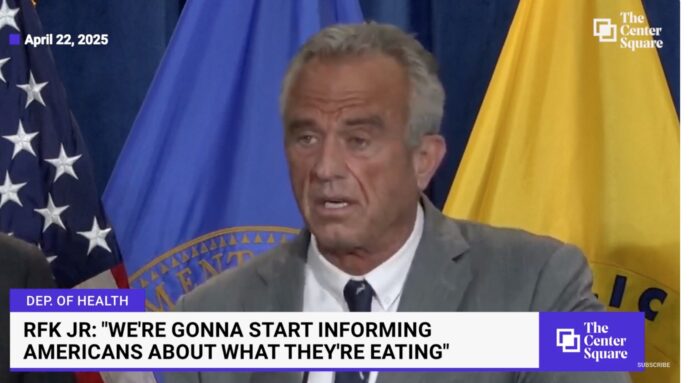By THERESE BOUDREAUX | THE CENTER SQUARE
Eight petroleum-based synthetic food dyes must be phased out of the American food supply and medications within the next year, according to U.S. Food and Drug Administration Commissioner Martin Makary.
The dyes, commonly used in ultra-processed foods, are Blue 1, Blue 2, Green 3, Red 40, Yellow 5, Yellow 6, Citrus Red, and Orange B.
“We are simply asking American food companies to replace petroleum-based food dyes with natural ingredients for American children, just as they already do for children in other countries,” Makary said during a Tuesday news conference.
Makary echoed concerns from some health groups that petroleum-based dyes are correlated with several health conditions in children, including ADHD, obesity, diabetes, cancer and allergic reactions.
The FDA will revoke authorization of Citrus Red and Orange B within the coming weeks. The food industry has until the end of 2025 to transition from the six other synthetic food dyes listed to natural alternatives.
To assist with the effort, the FDA will accelerate the approval process of natural food colorings.
“For too long, some food producers have been feeding Americans petroleum-based chemicals without their knowledge or consent,” Health and Human Services Secretary Robert F. Kennedy, Jr. said. “These poisonous compounds offer no nutritional benefit and pose real, measurable dangers to our children’s health and development. That era is coming to an end.”
According to the FDA in 2023, “the totality of scientific evidence shows that most children have no adverse effects when consuming foods containing color additives, but some evidence suggests that certain children may be sensitive to them.”
Foods that often contain petroleum-based color additives include sugary drinks and juices, cereals, snack foods, condiments, salad dressings, pudding, jams, yogurt, pickles, and sausages. Popular snacks such as M&M’s, Doritos, and Froot Loops include one or more of these dyes.
The Center for Science in the Public Interest, which has long advocated for banning petroleum-based food dyes, said the announcement was a victory for food health and safety.
“The most important thing to know about food dyes is that their only purpose is to make food companies money. They are purely cosmetic, serving no nutritional function,” CSPI President Peter Lurie said. “We don’t need synthetic dyes in the food supply, and no one will be harmed by their absence.”
The FDA also revoked authorization for synthetic dye Red No. 3 as a food and drug additive in January, as The Center Square reported.
In light of the FDA’s announcement, the International Dairy Foods Association said it will voluntarily remove petroleum-based dyes from milk, cheese, and yogurt products sold to schools for the National School Lunch and Breakfast Programs beginning in 2026.
The National Confectioners Association said safety remains its top priority. Christopher Gindlesperger, the organization’s senior vice president of Public Affairs and Communications, said the FDA and other regulatory agencies have deemed its products safe.
“FDA and regulatory bodies around the world have deemed our products and ingredients safe, and we look forward to working with the Trump Administration and Congress on this issue,” Gindlesperger said in a statement. “We are in firm agreement that science-based evaluation of food additives will help eliminate consumer confusion and rebuild trust in our national food safety system. We follow and will continue to follow regulatory guidance from the authorities in this space, because consumer safety is our chief responsibility and priority.”
